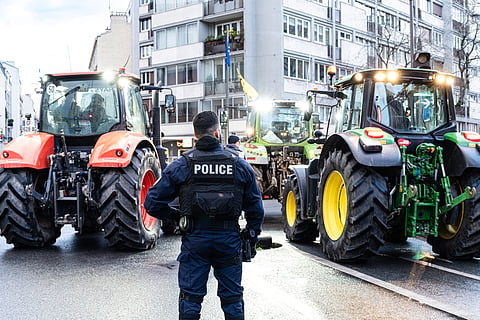

The impact of climate change on agriculture is becoming increasingly direct and severe, leaving farmers to battle this crisis largely on their own.
It’s not just developing countries that are struggling with insurance issues— developed nations are also facing serious challenges.
In Europe, seasonal disasters such as annual droughts, floods and hailstorms are causing significant losses to both crops and livestock. The unfortunate reality is that farmers are left alone to bear around 70 per cent of these losses — meaning they have neither insurance coverage nor compensation.
A joint report by the European Investment Bank (EIB) and the European Commission has warned that if agriculture is to be protected from climate-related risks, insurance coverage must be strengthened.
According to the report, Europe’s agricultural sector incurs an average annual loss of €28.3 billion (approximately Rs 2.55 lakh crore), which is about six per cent of the continent’s total agricultural and livestock production.
The report warns that if immediate action is not taken, this loss could rise from 42 per cent to 66 per cent by 2050 — meaning the threat will intensify with each passing decade.
Despite such massive losses, only 20 per cent to 30 per cent of climate-related agricultural damages in Europe are currently covered by insurance. In other words, about 70 per cent of the losses remain uninsured.
In a press statement, EIB Vice President Gelsomina Vigliotti said, “Climate-related risks are creating enormous uncertainty in food production. Insurance and risk-reduction schemes are now essential to enable farmers to invest and adopt sustainable agricultural practices.”
The report suggests that the European Union should develop catastrophe bonds, public-private insurance partnerships, and rapid relief funding mechanisms to ensure swift assistance during disasters.
Moreover, the agricultural sector must not rely solely on insurance. It also needs to adapt to the changing climate. This includes adopting drought-resistant crops, smart irrigation systems, and better crop diversification.
European Agriculture Commissioner Christophe Hansen has also expressed concern that climate risks might cause banks to pull back from investing in agriculture.
“If most of the losses are uninsured, banks may hesitate to lend. Therefore, I urge all member states to include new financial measures in their Common Agricultural Policy (CAP) strategic plans to proactively manage climate risks," Hansen was quoted.
This study is the first comprehensive review of the agricultural insurance systems across 27 European countries. It was prepared by the EIB Advisory under the FI-Compass platform, with collaboration from global insurance firm Howden.
So far, the EIB has supported the European agricultural sector in three main ways: providing direct loans and guarantees to agribusinesses, financing rural infrastructure such as irrigation and roads, and offering technical advice on how to attract additional investments through the use of CAP grants.
The clear message from the report is that insurance alone is not enough. To deal with the uncertain impacts of future climate change, agriculture must be made climate-resilient. For this, Europe must be prepared on policy, financial, and technical fronts.